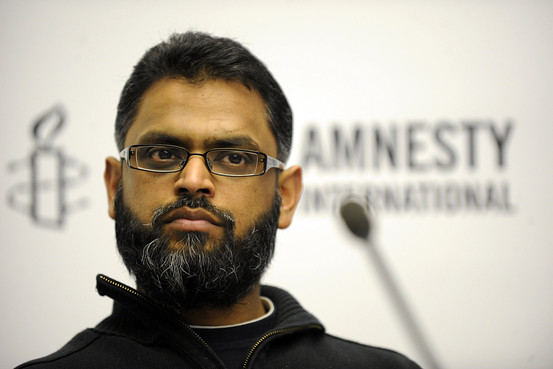
“You are now the property of the United States and you have no rights.” These were the first words to greet me and other prisoners held in the US prison camp at Guantanamo Bay. Ten years on little has changed.
My life changed irretrievably on the night of 31st January 2002 when Pakistani and US intelligence agents abducted me from my Islamabad house in the middle of the night, in front of my family, at gunpoint, and took me to a series of secret and military prisons that included Kandahar, Bagram and Guantanamo Bay
After three years of an ordeal that included being, punched and kicked, forcibly stripped, shaved, violated, spat upon; enduring racial and religious abuse, incommunicado incarceration in a cell smaller than an average house toilet; being subjected to over 300 interrogations, sometimes with my wrists shackled to my ankles from behind my back; watching the Quran being desecrated; being threatened with torture in Syria or Egypt; being subjected to the sounds of screams I was lead to believe were members of my family and, watching two prisoners being beaten to death, I was finally returned to the UK and my family – which included a 3-year old son I’d never seen.
Like the overwhelming majority of the prisoners there I was interrogated by the world’s most powerful law enforcement and intelligence agencies: CIA, FBI, MI5, CITF, US military intelligence and many others. I have learned too – since my release – that many other nations were allowed to use the Guantanamo experiment to interrogate dissidents from their own countries, such as Libyan intelligence under Colonel Gaddafi. But, despite the arsenal of weapons – both metaphoric and real – there were never any charges or trial for me.
Shortly after my return I joined the human rights NGO Cageprsioners and found myself establishing strong links with former Guantanamo prisoners all around the world, in addition to their lawyers and the families of those awaiting the return of their loved ones.
What became evident to me early on was that I was facing an internal struggle based on my faith, survivor’s guiltand the quest for natural justice, which has become my resolute aim to date.
Since then and now I have, by the grace of God, travelled the world to campaign for those left behind in Guantanamo. I have toured with former US soldiers who were once Guantanamo prison guards, speaking about the evils of US foreign adventures and have sat with world leaders asking them to take in prisoners unable to return to their countries of origin for fears, ironically, of imprisonment and torture.
I’ve met prisoners from different suspect communities who once faced similar experiences to mine – and worse; I’ve met with victims of British and American rendition who have become leaders of the their country after the Arab spring and, I’ve returned to the house where I was abducted from in Pakistan to record the scene of the crimeand, I’ve met with the family of a woman whose screams once echoed through Bagram’s soulless prison.
I’ve earned descriptions as that range from being ‘Mandela-like’ in my lack of bitterness towards my captors to being called a terrorist sympathiser (notwithstanding the little detail that Nelson Mandela’s 27- year imprisonment was as a terrorist under apartheid South Africa) because I advocate dialogue with Al-Qaeda and the Taliban well before deals were being brokered in Qatar to accommodate the latter.
Whatever I’ve seen or done in these years the one thing I’ve not been able to recover is the one thing I’ve been fighting to get back: normality. There’s no such thing any more. After all, what’s normal about expecting your family to understand all that has transpired in the world’s most secret prisons to terrorism suspects, when that is not even possible for ‘ordinary decent criminals’? In addition to the irrepressible sense of camaraderie that exists between us all, this is one of resonating features that unite the former prisoners together: a hushed recognition of one another’s pain.
When men are eventually released how are they supposed to renew their familial relationships when their internal survival mechanism told them to stop believing they were fathers, husbands and sons? How can they rebuild their lives and be part of society again once the world’s most powerful men (and media) have described them as the “worst of the worst” terrorist scumbags who are bent on destroying rather than building?
How do children whose fathers are in Guantanamo explain to their friends that “daddy is in prison” when society by default maintains that prisoners are bad men?
And what of those poor, innocent children whose lost childhoods without a father for so long can never be reclaimed? What can fill the chasm created when the child needed the father most – and he wasn’t there to help?
Speaking of children, the past decade in Guantanamo has witnessed has numerous child-prisoners who have grown into adults behind the razor wire, able-bodied men’s once healthy limbs amputated, perfectly sane men losing their minds and, freedom gained at last, for some, in a coffin.
To mark the tenth anniversary since the first prisoners were sent to Guantanamo, as pictures of men kneeling in orange jumpsuits, masked and goggled – looking like the extra-terrestrial beings we were told they were – shocked the world we will be hosting several events in the UK.
The171 remaining Guantanamo prisoners, however, will be protesting their innocence via one of the few methods available to them: hunger-strike. Even if that means being forcibly restrained in a chair and pumped with liquid food through the nostril to keep them alive – as the living dead men they’ve become in the world’s most notorious prison – which is capable of destroying lives both inside and out – that we, and history, will never forget.



